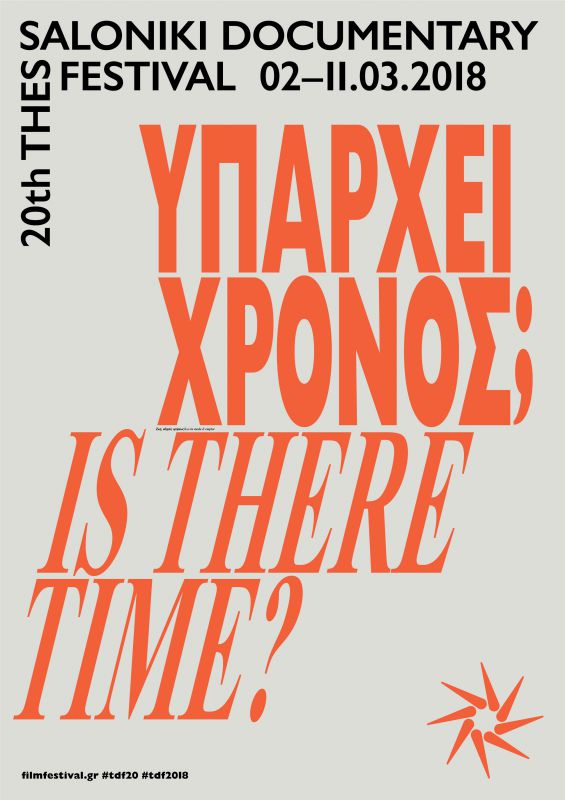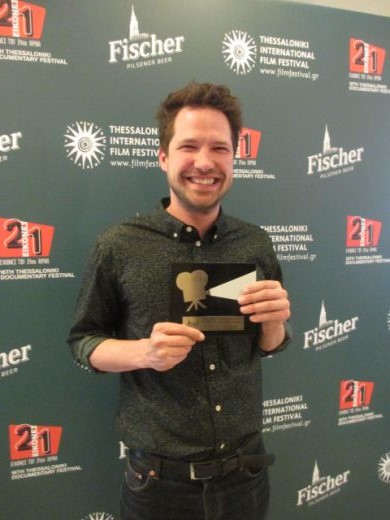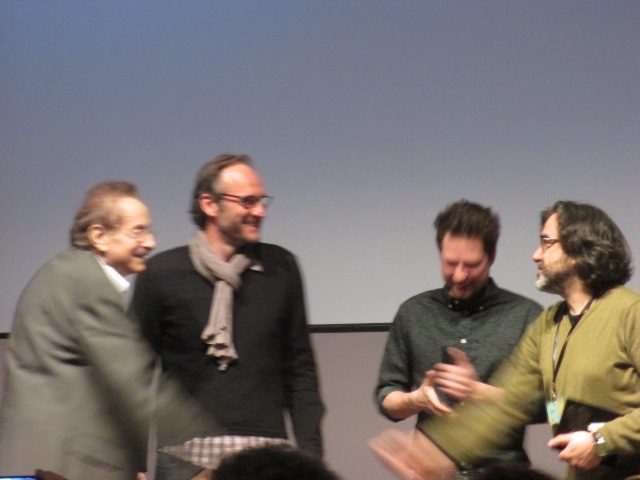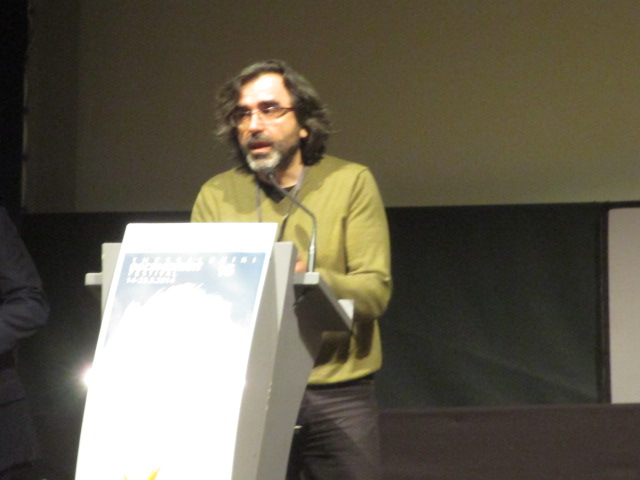|
|
||
|
Pro Tools
FILMFESTIVALS | 24/7 world wide coverageWelcome ! Enjoy the best of both worlds: Film & Festival News, exploring the best of the film festivals community. Launched in 1995, relentlessly connecting films to festivals, documenting and promoting festivals worldwide. Working on an upgrade soon. For collaboration, editorial contributions, or publicity, please send us an email here. User login |
Press Conference- Nastia Tarasova (Linar) and Christoph Schaub (Millions can Walk)
Linar, this year’s opening film, follows the story of Linar, a young boy from Russia, who travels to Italy to receive a heart transplant, as the practice is illegal in his home country. Commenting on the absurdity of this law, Nastia Tarasova said: “In Russia, organ transplantations are legal between adults, but they are illegal when the donor and recipient are children. This is a very controversial issue. The 1990s were a difficult time for Russia, and the mafia was running a thriving black market for human organs. This was why the government decided to pass this law. Russians have little trust on medical ethics.” Talking about her acquaintance with Linar, the filmmaker said: “The professor who operated him showed me a picture of Linar in the operating room that was etched in my memory. I decided to make this film because the prohibition of transplant surgeries is not a widely known issue.” Commenting on the production process and her evolving relationship with her young protagonist, Ms Tarasova said: “We filmed for a total of two years, with some intervals. I wouldn’t dare claim I could replace his mother, who was not always there by his side, but Linar did miss me and always waited for me and the film crew.” Tarasova also talked about the importance of keeping the right balance when dealing with such a dramatic theme: “At first I thought it would be easy to work with a child, but it proved very hard to keep my distance and maintain a balanced view. We decided with my cameraman not to complete the film if Linar died. It would have been an unbearable emotional burden.” Asked about Linar’s whereabouts, Nastia Tarasova said: “He is doing fine and he is living a normal life. When he turns twenty, he will have to undergo a second surgery, since he will need an adult heart transplant.” Asked about the medical expenses of the operation, she said: “The Health Ministry covered all medical expenses. This was the first heart transplant of its kind and it drew a lot of media attention.” In her closing remarks, Ms Tarasova talked about the message of her film and its influence on her compatriots: “I was overjoyed to see many people say, after having watched the film, that they wanted to become donors to save lives.”
When asked how India can aspire to become a superpower when it does not respect the rights of its own poor population, the director commented: “India is a nation of great contradictions. It is a developed country, yet poverty is widespread. It is hard for a poor Indian to understand how he can be poor, when his country has nuclear missiles.” In his closing remarks, the director commented on the prospects of the fight of the Indian farmers: “Amazingly, their march was successful. But they need to be prudent, because politics is not fair. Politicians promise a lot of things that they fail to deliver. You know this all too well in Greece.”
The parallel events of the 16th TDF are financed by the European Union’s Regional Development Fund for Central Macedonia, 2007-2013.
-OFFICIAL 16TH TDF PRESS RELEASE-
Edited by Vanessa McMahon 18.03.2014 | Thessaloniki's blog Cat. : Press Conference- Nastia Tarasova (Linar) and Christoph Schaub (Millions can Walk) News
|
LinksThe Bulletin Board > The Bulletin Board Blog Following News Interview with EFM (Berlin) Director
Interview with IFTA Chairman (AFM)
Interview with Cannes Marche du Film Director
Filmfestivals.com dailies live coverage from > Live from India
Useful links for the indies: > Big files transfer
+ SUBSCRIBE to the weekly Newsletter Deals+ Special offers and discounts from filmfestivals.com Selected fun offers
> Bonus Casino
User imagesAbout Thessaloniki Mcmahon Vanessa Mcmahon Vanessa Vanessa McMahon Covered the 13th and 14th, and 16th edition. Through its tributes, it focuses both on discovering filmmakers with a unique cinematic point of view, and on the internationally recognized for their contribution to documentary. Contributions from Buno Chatelin http://tdf.filmfestival.gr/default.aspx?lang=en-US&loc=6&page=760 View my profile Send me a message My festivalThe EditorUser contributions |


















 16th Thessaloniki Documentary Festival – Images of the 21st Century. 14-23 March 2014. Nastia Tarasova (Linar) and Christoph Schaub (Millions can Walk) gave the first press conference of the 16th edition of the Thessaloniki Documentary Festival.
16th Thessaloniki Documentary Festival – Images of the 21st Century. 14-23 March 2014. Nastia Tarasova (Linar) and Christoph Schaub (Millions can Walk) gave the first press conference of the 16th edition of the Thessaloniki Documentary Festival. Christoph Schaub talked about the extraordinary filming conditions of his documentary Millions can Walk. The film follows a massive protest march, in which thousands of Indians demanded their right to land ownership. As Mr Schaub explained, the film has two directors: “We co-directed the film with Kamal Musale. I was inspired to make this film in 2010, during my first visit to India. Three weeks before shooting was scheduled to begin, I decided to go back to India and prepare for the film, but I was told in Bombay airport that I was blacklisted and could not enter India. I was sent back on the same plane to Switzerland. I still don’t know what happened exactly. From what I was told later by the Swiss embassy in Delhi, supposedly I had been in touch with a rebel group fighting for the right of farmers to own land. By Indian standards this is a relatively small group, but in absolute terms it is a large group implicated in violent actions. Despite the prohibition, I still wanted to make the film, as I thought it touched on a particularly important issue. This is when I started working with Kamal Musale, who spoke the language and lived in India. I completed the preparations, he did the shooting and I was in charge of post production. It is strange for a director to be far from the film shoot. I could still see the material immediately, thanks to the internet and Skype, but when you make a documentary you constantly have to make decisions on the spot. This was a strange but very interesting experience.”
Christoph Schaub talked about the extraordinary filming conditions of his documentary Millions can Walk. The film follows a massive protest march, in which thousands of Indians demanded their right to land ownership. As Mr Schaub explained, the film has two directors: “We co-directed the film with Kamal Musale. I was inspired to make this film in 2010, during my first visit to India. Three weeks before shooting was scheduled to begin, I decided to go back to India and prepare for the film, but I was told in Bombay airport that I was blacklisted and could not enter India. I was sent back on the same plane to Switzerland. I still don’t know what happened exactly. From what I was told later by the Swiss embassy in Delhi, supposedly I had been in touch with a rebel group fighting for the right of farmers to own land. By Indian standards this is a relatively small group, but in absolute terms it is a large group implicated in violent actions. Despite the prohibition, I still wanted to make the film, as I thought it touched on a particularly important issue. This is when I started working with Kamal Musale, who spoke the language and lived in India. I completed the preparations, he did the shooting and I was in charge of post production. It is strange for a director to be far from the film shoot. I could still see the material immediately, thanks to the internet and Skype, but when you make a documentary you constantly have to make decisions on the spot. This was a strange but very interesting experience.”









